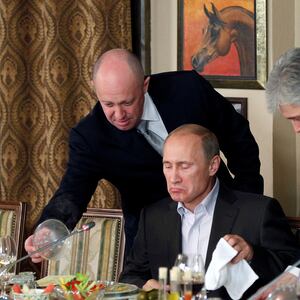Nearly six months into a war in Ukraine that Russia can’t seem to decisively win, Russian President Vladimir Putin is bragging this week that Russia’s weapons are decades ahead of competitors.
“Many of them are years, maybe decades ahead of their foreign counterparts, and in terms of tactical and technical characteristics they are significantly superior,” Putin said at an annual arms show Monday, according to Interfax.
And in an apparent show of camaraderie, Putin vowed Monday that he wants to expand Russia’s arms trade with other countries around the world, claiming that foreign countries value Russian weapons for their efficiency and high quality.
“Russia sincerely cherishes historically strong friendly, truly trusting ties with the states of Latin America, Asia, Africa, and is ready to offer its partners and allies the most modern types of weapons—from small arms to armored vehicles and artillery, combat aircraft and unmanned aerial vehicles,” Putin said.
Moscow is indeed, a top weapons exporter. Russia accounts for 20 percent of global arms exports and is the second-largest exporter of weapons in the world, ranking just after the United States, according to an analysis of exports tracked by the independent research entity the Stockholm International Peace Research Institute (SIPRI) between 2016 and 2020. India, China, and Algeria are the top recipients of Russian weaponry, and Russia is also the main supplier of arms to Egypt, Vietnam, Kazakhstan, Belarus, and Angola, according to the report. Russia exports major arms to 45 states in all.
But Putin’s claims about Russian weaponry and plans for trade appear to diverge from reality, as Russia’s weapons export business is starting to feel the cascading effects of waging war in Ukraine, according to military and intelligence assessments. Russia has lost 1,876 tanks, upwards of 4,000 armored vehicles, and 985 artillery systems, and more, in the war so far, according to data from the General Staff of the Armed Forces of Ukraine shared Monday.
Adding to that, Russia’s ability to replenish its stocks is quickly dwindling as the bite of sanctions settles in. U.S. officials moved to sanction entities in Russia’s defense industrial base earlier this year, including a state-owned Russian defense conglomerate focused on airborne weapons and weapon systems, as well as anti-radar missiles, ammunition, and radar systems. And already high tech components aren’t funneling into the country anymore and manufacturing plants are shuttering, according to Reuters.
“The industry could struggle to meet many of these requirements, partially due to the effects of sanctions and lack of expertise,” a June British intelligence assessment states. “Russia's production of high-quality optics and advanced electronics likely remain troubled and could undermine its efforts to replace equipment lost in Ukraine.”
Even before Putin chose to invade Ukraine again in February, the outlook for Russia didn’t look great. The balance of exports and imports was already bound to change in the coming years, namely due to China, as Beijing may soon not need to rely on Russia’s weapons as much in future years, according to SIPRI.
“Imports from Russia are likely to reduce in volume once China’s own industry manages to consistently produce the types of major arms that it has generally imported from Russia over the years,” the report notes.
Putin didn’t name any country as a particular focus for its weapons export business, but stressed that Moscow values all partners who have embraced Russia’s thinking in recent months. Putin added that weapons transfers from Russia will be key to shifting the world away from a unipolar world—in which the United States dominates—to a multipolar world.
“We highly appreciate that today our country has many allies, partners, like-minded people on different continents,” he said. “They choose a sovereign, independent path of development, they want to collectively resolve issues of global and regional security on the basis of international law, mutual responsibility and consideration of each other's interests. Thus, they contribute to the protection of a multipolar world.”
It’s not the first time Putin has bragged about Russian weapons in recent months while waging war in Ukraine. In March, Putin bragged to Russia’s Federal Assembly that additions to Russia’s nuclear arsenal would make the United States’ defenses “useless”—even though some of the proposed additions to Russia’s stocks are “outlandish,” according to The Washington Post.
Putin’s claims at the army confab this week echo his earlier insistence that Russian arms development is lightyears ahead of other nations’ work.
“As you may have guessed, no other country in the world has anything like that,” he said of a nuclear-powered underwater drone in March. “Possibly, something similar will appear someday, but our guys will come up with something else by then.”






